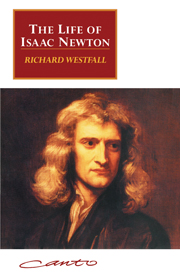Book contents
- Frontmatter
- Dedication
- Contents
- Preface
- Acknowledgments
- A Note About Dates
- Plates
- 1 A Sober, Silent, Thinking Lad
- 2 The Solitary Scholar
- 3 Anni Mirabiles
- 4 Lucasian Professor
- 5 Publication and Crisis
- 6 Rebellion
- 7 Years of Silence
- 8 Principia
- 9 Revolution
- 10 The Mint
- 11 President of the Royal Society
- 12 The Priority Dispute
- 13 Years of Decline
- Bibliographical Essay
- Index
4 - Lucasian Professor
Published online by Cambridge University Press: 05 September 2013
- Frontmatter
- Dedication
- Contents
- Preface
- Acknowledgments
- A Note About Dates
- Plates
- 1 A Sober, Silent, Thinking Lad
- 2 The Solitary Scholar
- 3 Anni Mirabiles
- 4 Lucasian Professor
- 5 Publication and Crisis
- 6 Rebellion
- 7 Years of Silence
- 8 Principia
- 9 Revolution
- 10 The Mint
- 11 President of the Royal Society
- 12 The Priority Dispute
- 13 Years of Decline
- Bibliographical Essay
- Index
Summary
SHORTLY AFTER HIS RETURN from Woolsthorpe late in April 1667, the magnificent funeral of Matthew Wren, bishop of Ely, escorted by the entire academic community in full regalia according to their ranks and degrees, must have reminded Newton that he stood then only on the first step of the university hierarchy and that others loomed immediately ahead. In only a few months he would face the first and by far the most important of these, the fellowship election. As with the scholarship three years earlier, Newton's whole future hung in the balance of this election. It would determine whether he would stay on at Cambridge and be free to pursue his studies or whether he would return to Lincolnshire, probably to the village vicarage that his family connections could have supplied, where he might well have withered and decayed in the absence of books and the distraction of petty obligations. On the face of it, his chances were slim. There had been no elections in Trinity for three years, and, as it turned out, there were only nine places to fill. The phalanx of Westminster scholars exercised their usual advantage. The growing role of political influence, whereby those with access to the court won letters mandate from the king commanding their election, was notorious. For the rest, all depended on the choice of the master and eight senior follows, and stories of influence peddling filled the air.
- Type
- Chapter
- Information
- The Life of Isaac Newton , pp. 61 - 84Publisher: Cambridge University PressPrint publication year: 1994

